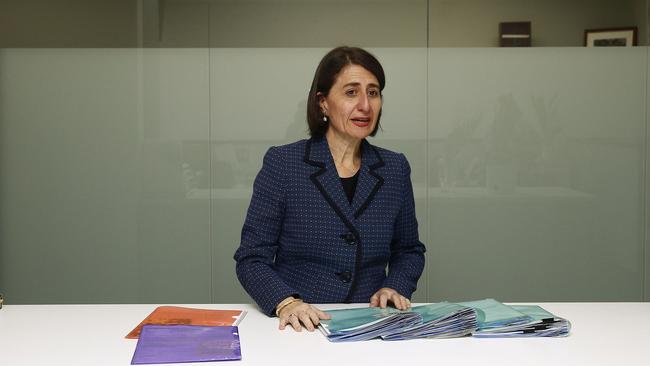National anthem change a chance to show who we’ve become
Gladys Berejiklian’s anthem call reflects the recent rise in our emotional intelligence.

The Enlightenment period, broadly described, put logic, criticism and freedom of thought over dogma, blind faith and superstition. Education and reason were identified as the means to progress and improve human life and character.
An important facet, not strongly featured in public policy until now, is the emotional quotient.
The best manifestation of intelligence incorporates emotional intelligence. The best leaders recognise their own emotions, as well as the emotions of others. They anticipate the impact of words and actions on the feelings of their community.
The pandemic has triggered a widespread examination and reassessment of our relationships — with family, friends, community and nature.
What do we really need, when it comes down to it? What point is progress and achievement, if some are left behind? How do we experience and celebrate joy, when we know others are lost in grief?
“After the horrible year we’ve had, I just really appreciate as a leader how important it is to bring people together … when you’ve been through what our state’s been through, what our citizens have been through, I just feel hurt for people who don’t feel the anthem includes them … that one word might make a difference to some people.”
That was the Premier of NSW this week, speaking about her desire to see the national anthem changed. Gladys Berejiklian said she supported changing the line “We are young and free” to “We are one and free” to acknowledge the nation’s 60,000 years of Indigenous history.
It is NAIDOC Week, a celebration of the history and achievements of Aboriginal and Torres Strait Islander peoples. The national theme for 2020 is “Always Was, Always Will Be”.
The NAIDOC website says: “It’s about seeing, hearing and learning the First Nations’ 65,000+ year history of this country — which is Australian history. We want all Australians to celebrate that we have the oldest continuing cultures on the planet and to recognise that our sovereignty was never ceded.”
The issue here isn’t whether the anthem should be changed — although it absolutely should be, immediately — it is about how the pandemic has supercharged our ability to see and feel for others. Berejiklian expressed it well when she said: “I feel for Indigenous Australians who don’t feel the national anthem reflects them and their history.”
The hurt felt was communicated not by noisy protest, but by silence.
Last year, at the State of Origin rugby league series, several high-profile Indigenous players stayed silent during the singing of the national anthem. This month, at the 2020 series opener, a few players appeared not to sing.
Berejiklian made her comments on the morning of the second Origin match on Wednesday. I see you, she was saying.
Now, we all see. And if change doesn’t occur, the silence might spread. In solidarity, out of feelings of concern for the feelings of others, people might stop singing the national anthem. There doesn’t need to be an organised “no sing” movement, it is likely to just happen, of its own accord.
Another leader to talk recently of seeing people is Joe Biden. In his victory speech, he spoke of unifying the red and blue states, and of “Democrats, Republicans and Independents. Progressives, moderates and conservatives. Young and old. Urban, suburban and rural. Gay, straight, transgender. White. Latino. Asian. Native American.”
Conservative culture warriors can curl the lip here, and dismiss these comments as soppy identity politics, but things have changed, and our best thinkers will recognise that.
Biden also said: “Let’s give each other a chance. It’s time to put away the harsh rhetoric. To lower the temperature. To see each other again.”
Back home, Nationals senator Matt Canavan didn’t get the memo. In response to the anthem change suggestion, he engaged in a heated argument on television with a Northern Territory Labor senator.
Canavan said: “I don’t think the writers of this anthem when they say ‘young’ are intending any kind of offence here” and “We are a young nation. We have old civilisations and we have a rich history over tens of thousands of years but we are a young country.
“That is something important to recognise as well. So I just think it is another example of people taking offence when there was no offence intended.”
Canavan’s contribution has proved useful, to show us what we don’t want to be. This is what it looks like when leaders miss the point, and when they have no ability to see and recognise the feelings of others. This is how, with ignorance and self-importance, a leader can denounce the feelings of others as non-existent.
The pandemic has changed many of us, for the better. Our deprivations have led to a greater regard for the natural environment, a greater concern for others, an increased sense of community, and a new determination to unite and progress, while restoring the disenfranchised and lifting up the less fortunate.
The best leaders won’t pretend this change hasn’t happened and they won’t grumpily resist; they will stand up for us, light the path, and show us the way.



Every cloud has a silver lining, as we all know. What has been revealed recently — to me at least — is that our collective troubles have produced a dividend. It feels like a profound calibration in modern thinking, which has been continuously developing since the Enlightenment of the 17th and 18th centuries.